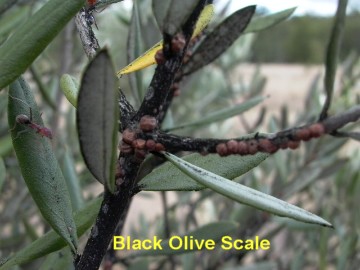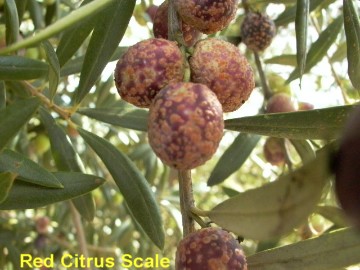Pests & Diseases » Scale Insects
There are two types of scale insects that attack olive trees in Australia; soft scale and armoured scale:
- Soft scale species belong to the Coccidae family and include the Black Olive scale (Saissetia oleae) and the Soft Brown scale (Coccus hesperidum)
- Armoured species belong to Diaspididae family and include: Oleander scale (Aspidiotus nerii), Red scale (Aonidiella aurantii), San Jose scale (Comstockaspis perniciosus) and Olive scale (Parlatoria oleae)
Crawlers walk over the plant surface, are blown by wind to other trees, or can be inadvertently moved by people or birds. Armoured scales settle down permanently after a day or two in the crawler stage, molt and begin to form their characteristic covers. Soft scales move around for a while longer but also eventually settle at permanent feeding sites.
Sooty mould is an unsightly fungus that is often associated with scale infestation. The mould grows on the excretions (honey dew) produced by the scale insects as they feed on the tree. The fungus does not cause any direct damage to the trees but can cause a significant reduction in photosynthesis by blocking sunlight from the leaves. Sooty mould can only be removed if the insects producing the honeydew are controlled. Once the scale insects are gone the honeydew supply stops and the sooty mould will slowly dry and flake off with exposure to sunlight and rain.
Biological control
Beneficial insects that are natural enemies of scale can be used to help manage scale. These include: the scale eating lady beetles (Rhizobius spp.). The larvae of these predacious lady beetles can be found under the female soft scales feeding on scale eggs and crawlers. Many parasitic wasps are important natural enemies of scales,including species of Aphytis, Coccophagus, Encarsia and Metaphycus.
Parasite activity can be monitored by checking scale covering for the round exit holes made by emerging adult parasites and by turning armoured scale over and looking for immature parasites.Growing flowering plants around the grove will help to augment natural enemies. Adult parasitic wasps live longer, lay more eggs, and kill more scales when they have nectar or honeydew to feed on.
Excessive amounts of dust from roads or cultural operations can disrupt the activities of natural enemies resulting in reduced scale control. Ants can also deter natural enemies, and if large numbers of ants are climbing up trunks to tend scales they should be controlled. Ants can be denied access to plant canopies by applying a sticky material (such as Stick'em) to the base of the tree trunk.
Some beneficial insects are commercially available for release against olive scale pests in Australia and can be obtained from specialist suppliers. Insecticides can have direct effects on natural enemies by killing them or indirect effects by eliminating their hosts and causing starvation. In some cases, insecticides such as mineral spray oil can be successfully integrated into the system without harming natural enemies.
Chemical control
Currently Pyripoxyfen (Admiral rate-0.5ml/L) and mineral/botanical oils are the only insecticides registed in Australia for control of scale in olives.
Admiral is a hormorne regulator that works by disrupting the reproductive processes of the insect causing a dramatic population decrease the following season. Admiral is regarded as having low mammalian toxicity and is manufactured by Sumitomo Chemical Australia click here for the manufacters guide on its use. In Australia Admiral is available from the The Olive Centre.
Mineral and botanical oils work by smothering the young insects when they are at the crawler stage.
Applications of these chemicals must be carefully timed to reach immature scale in the crawler stage. At later stages the scale are very resistant to treatments. The main crawler stages for scale are in spring and summer. A second crawler stage may also be present in autumn. At least two sprays during each crawler stage are necessary because treatments do not affect the eggs. The second spray targets crawlers developing from the eggs still unhatched at the time of the first spray.
Traps made of double-sided sticky tape can be used to determine when crawlers are hatching. Before crawlers begin to emerge in spring, tightly encircle several twigs or branches on the infested tree with transparent tape that is sticky on both sides. Change the tapes at regular intervals, about weekly, and examine the tapes with a hand lens to identify the crawlers. Once eggs begin hatching, scale crawlers get stuck on the tapes and appear as yellow or orange specks.
Apply insecticide treatments after a sharp increase in crawler production occurs or after crawler numbers have peaked and begin to decline.
In the past, other insecticides have been registered with "off label permits" for the control of scale insects in olives in Australia these include : Methidathion (Supracide, rate-1.25m/L), Buprofezin (Applaud rate-3-6m/L).
Please note: it is a legal requirement that label instructions are followed, if olives are not listed on the label of the pesticide, it is either not registered for use on olives or an off label permit is required.
Pesticide registrations and off-label permits for olives can be viewed and downloaded from the Australian Pesticides & Veterinary Medicines Authority website: APVMA (click on search for a permit tab then enter olive under the crop section). Permits can also be checked at the AOA Website











